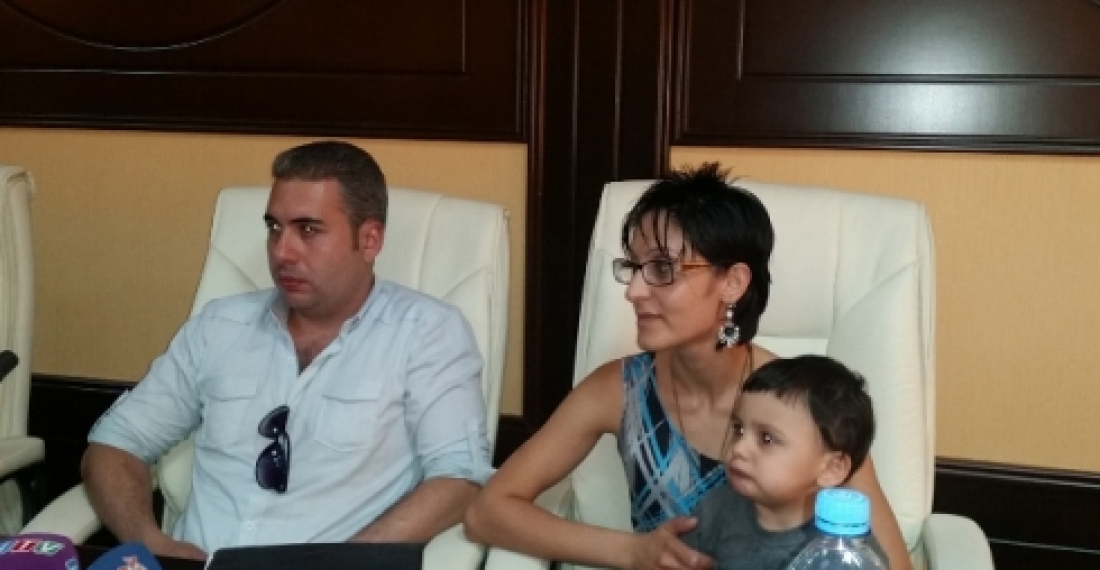The tense relations between Armenia and Azerbaijan took a new twist on Thursday (17 September) with the arrival in Baku of a young Armenian couple and their baby son. The couple asked Azerbaijan for political asylum, and on Friday made their reasons known to an excited group of journalists gathered at the International Press Club in the centre of Baku. According to the Azerbaijani News Agency Trend the asylum seeker is Vahan Martirossian who describes himself as the Head of Armenian Intra-National Liberation Movement. According to the Azerbaijani News Agency TREND Martirossian told the journalists that "his public and political work against Serzh Sargsyan's criminal regime and corruption in Armenia led to pressures on him by that country's government".
Referring to the conflict between Armenia and Azerbaijan Martirossian said that "No one wants a resumption of war in Armenia. That would be the greatest tragedy for our two peoples". Martirosyan said this would be beneficial to those who make profit from such a situation.
Martirossian also said that in its current state Armenia's army is unable to fight not only against the Azerbaijani army but even against a third world army in Africa. "No one will tell the truth about Sargsyan's criminal regime better than the Azerbaijani media," said Martirosyan. "This is one of the reasons why I am here." "But I wasn't expecting a hundredth of the hospitality that I have met with here. The attitude towards me is excellent, at the highest level. I think if the borders are opened, a huge stream of refugees from Armenia will rush to Azerbaijan," Trend quoted Martirossian as saying.
Martirossian said that he appealed to the offices of the United Nations and International Red Cross Society in Azerbaijan: “I want them to contact with Armenia in any form. I left my mother there. My wife’s family is also there. I don’t know how the government will treat them. I would like them to check their conditions,” he added.
In the first reaction to the political defection Vahan Baghdasaryan, the head of faction of the governing Republican Party in the Armenian Parliament, told News.am “One should not rely on the Azerbaijani media reports. Let's wait for formal information. We will issue a statement then,” The Parliamentarian added that Martirosyan, had chosen the wrong country to seek asylum in since Azerbaijan had a bad human rights record and decided to withdraw from the Euronest Parliamentary Assembly because it was not able to accept the constructive criticism by the European Parliament that slammed Baku for crackdown on human rights. Some media are also reporting that the Armenian authorities are saying that there is a criminal case against Martirossian in Armenia for stealing 4000 US$ from a relative.
Commonspace.eu political editor said that "regardless of the exact details of the case, some of which are yet to emerge, the defection adds a further strain in relations between Armenia and Azerbaijan. It comes at an awkward moment for Armenia when talks are going on on sensitve constitutional amendments, whilst in Baku it is seen as an opportunity, given that Azerbaijan has recently been under great pressure from the international community because of its human rights record. The arrival of a young Armenian family in Baku claiming political asylum, and the fact that Martirossian is able to articulate his views well, are seen as a a great propaganda triumph.
Beyond that however it would simply complicate further relations between the two countries,. and make the possibility of contacts between civil society activists even more difficult than it recently has become"
souce; commonspace.eu with agencies
photo: Vahan Martirossian with his wife and baby son speaking at the International Press Club in Baku on Friday, 18 September 2015, a day after the couiple defected to Azerbaijan seeking political saylum (picture courtesy of Trend News Agency).







